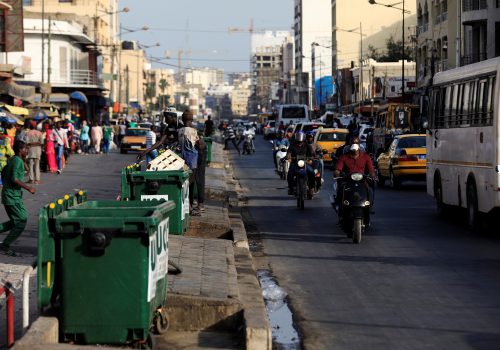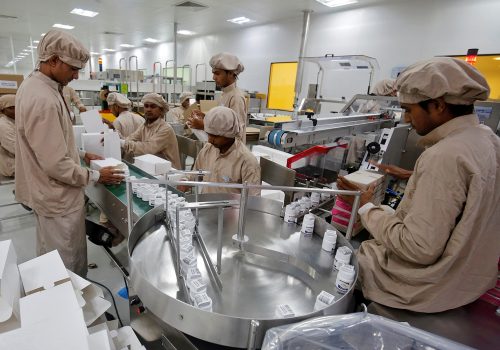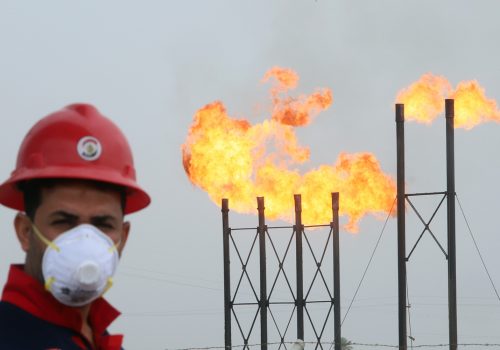CORONAVIRUS ALERT 3/25/2020
The Atlantic Council’s Coronavirus Alert is a regular summary of policy, economic, and business events around the emergency. To stay updated, sign up to the Coronavirus Alert here.
Summary:
Cases of coronavirus are spreading like a “bullet train” in New York, Governor Andrew M. Cuomo said, as cases worldwide topped 435,000. Among the latest to test positive for the virus is Prince Charles, heir to the UK throne. The White House and Senate leaders approved a historic $2 trillion economic aid package.
Statistics:
There are now more than 435,000 cases worldwide in more than 170 countries and territories; nearly 20,000 people have died.
QUOTE: “The worst of the pandemic is yet to come. Listen to the medical experts,” writes the editorial board of The New York Times. “It’s time for a national lockdown.”
HEALTH AND SCIENCE:
- The White House advised people who have travelled through or been in New York to self-quarantine for fourteen days, The New York Times reported. Governor Andrew M. Cuomo said the outbreak would inundate the state’s hospitals with as many 14,000 patients in the next few weeks, the newspaper said. The number of coronavirus cases in New York seems to be doubling every three days, the newspaper cited Cuomo as saying. More than 200 people in New York State have already died from the virus.
- The pandemic, previously rumbling like a freight train is now “like a bullet train,” said Cuomo, who laid out massive gaps in the state’s supply of medical equipment including ventilators, the Financial Times reported. “The rate of infection is going up. It is spiking. The apex is higher than we thought. And the apex is coming sooner than we thought,” Cuomo said at a convention center in the city being converted into an emergency hospital.
- Authorities have urged at least 167 million people in seventeen states, eighteen counties, and ten cities to stay home to check the spread of coronavirus, The New York Times reports, giving an updated round-up of the areas affected. “[T]he changes so fundamentally alter American life that some states, like Texas, have been hesitant to adopt them,” the newspaper says.
- Leaders in the United States and Europe may be drawing the wrong lessons from China’s progress in halting the spread of coronavirus, The Wall Street Journal said, citing doctors and health experts. “A lot of the lessons have been lost,” said Devi Sridhar, professor of global public health at the University of Edinburgh. “A lockdown helps buy time: The only way it will work is if you actually backtrack and start figuring out who has the virus.”
- Spain reported a further 738 deaths from coronavirus, the deadliest day in the country so far, Bloomberg reported. That takes the number of fatalities to 3,434, the news service said. Later today parliament debates Prime Minister Pedro Sanchez’s request to extend Spain’s state of emergency through April 11. Data from Italy, the worst-affected country in Europe, showed the slowest increase in active cases in almost a week, Bloomberg said.
- Prince Charles, the heir to the throne in the UK, has tested positive for coronavirus but is in good health, Sky News reported. Charles, the son of Queen Elizabeth, has been self-isolating in Scotland with his wife the Duchess of Cornwall, Sky said.
- Intensive-care demand will peak in between two and a half to three weeks from now, if the UK’s measures to tackle the spread of the virus work, Reuters cited Neil Ferguson, a professor of mathematical biology at Imperial College London, as telling lawmakers. Authorities may release some inmates to release pressure on the prison service, the BBC reported. About 10 percent of prison staff, or 3,500 people, are off sick or self-isolating, the BBC said.
- Some scientists hope the arrival of warmer weather will help spread the check of coronavirus temporarily, if it mirrors the seasonal pattern of other respiratory infections, the Financial Times reported.
- India began a national lockdown for three weeks at midnight on March 25 to halt the spread of coronavirus, including a total ban on leaving home for 1.3 billion people, Reuters reported. The announcement by Prime Minister Narendra Modi led to widespread panic buying, the news service said. India has 482 confirmed cases and has reported nine deaths from the virus, but health researchers say more than a million could be infected by mid-May, Reuters reported.
- Social media giant Facebook has in recent weeks shared anonymized, aggregated data with researchers looking at smartphones as a means to help slow the spread of coronavirus, news service Stat reported. A number of companies are in talks with the US government about sharing data too, Stat said, linking to a March 17 article in The Wall Street Journal. Researchers in the UK have launched Covid Symptom Tracker app to help track the spread of the virus, The Guardian reported.
QUOTE: “Given the enormous consequences of decisions around Covid-19 response, getting clear data to guide decisions now is critical,” Dr. Eran Bendavid and Dr. Jay Bhattacharya, professors of medicine at Stanford, write in The Wall Street Journal. “We should undertake immediate steps to evaluate the empirical basis of the current lockdowns.”
FINANCE AND ECONOMICS:
- The White House and Senate leaders agreed early on March 25 on a $2 trillion emergency bill to help business and workers stymied by the coronavirus pandemic, the Associated Press reported. It’s the largest economic aid package in history, AP said. That sets the stage for speedy progress through both congressional chambers following five straight days of talks, The Washington Post said.
- US futures indicated a lower opening following an 11 percent surge in the Dow Jones Industrial Average on March 24, when traders anticipated the economic stimulus agreement in Congress, CNBC reported. The Dow’s daily performance was the best since 1933, CNBC said.
- US President Donald J. Trump wants the country to reopen in time for Easter, about two weeks away, much sooner than what public health experts advise to contain the spread of coronavirus, reported The Wall Street Journal. “I would love to have the country opened up and just raring to go by Easter,” the newspaper cited Trump as saying in a Fox News interview.
- It’s not just households hoarding food because of the coronavirus pandemic but nations too, threatening global trade, Bloomberg reports. There are only a handful of examples so far: Kazakhstan’s export ban of wheat flour, temporary suspension of rice contracts by Vietnam, Serbia’s move to stop the flow of sunflower oil among other goods. “Is this the start of a wave of food nationalism that will further disrupt supply chains and trade flows?” the news service asks.
- “Will COVID-19 spread across the African nations as virulently as it has spread through Asia and Europe, or will Africa’s climate and demographics provide some shield?” writes The Atlantic Council’s Bronwyn Bruton. “The coronavirus toll in the crowded megacities and the refugee camps (…) will likely be both visible and terrible.”
QUOTE: “Help is on the way, big help and quick help,” said Senate Minority Leader Charles E. Schumer (D-NY), The Washington Post reported. “We’re going to take up and pass this package to care for those who are now caring for us, and help carry millions of Americans through these dark economic times.”
BUSINESS AND TRAVEL:
- The early stages of a coronavirus outbreak in Africa prompted the Tokyo 2020 Organizing Committee to reconsider its position, leading to the March 24 decision to postpone the summer games, CNBC reported. The prospect of the virus spreading in Africa is a “very dramatic development.” CNBC cited International Olympic Committee President Thomas Bach as saying on a call with journalists.
- More than 130 companies in the Americas and Europe have drawn at least $124 billion from their lenders in the past three weeks as they scramble for cash, the Financial Times reported.
- Occidental Petroleum is cutting salaries of workers by as much as 30 percent to cut costs, The Wall Street Journal reported, citing an internal email. Chief Executive Vicki Hollub will have an 81 percent pay cut, compared with 68 percent for senior executives, the newspaper said.
- Clothing retailers such as H&M and Primark are pausing or cancelling orders from Asian factories as demand dries up because of the economic shutdown, threatening millions of factory jobs in Asia, The Wall Street Journal reported.
QUOTE: “Sport is not the most important thing right now, preserving human life is,” said International Olympic Committee President Thomas Bach, Reuters reported. “This Olympic flame will be the light at the end of this tunnel.”
RESOURCES
- Johns Hopkins University interactive web-based dashboard to visualize and track reported cases in real-time.
- CDC provides frequent updates and background information on coronavirus.
- The World Health Organization daily situation reports.
- Harvard Business Review guidance on managing the emergency for corporate decisionmakers.
- The Society for Human Resource Management resources on managing communicable diseases.
- The Wall Street Journal has a useful guide to travel and travel insurance.
- State Department Travel Advisory for China.



